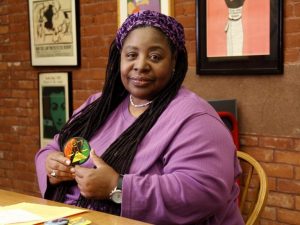What Future Physicians Should Know
BUILDING CONNECTIONS:
30 Days of Human Rights & Reproductive Justice
December 2024
To mark the end of this tumultuous year we are excited to kick off a month-long series exploring reproductive health justice through a human rights lens.
At AMSA we believe reproductive rights are human rights. Something we don’t explicitly get in our curriculum as medical students is a review of the core rights that every human being is afforded. We hope that by sharing the information and links here that we can empower you with this information, and that these resources can inform your philosophy for care for patients within reproductive health and beyond. Scroll down to explore the repro justice connection we make and click the links to learn more about each of the 30 Articles that detail our Human Rights.
Universal Declaration of Human Rights (UDHR)
“The power of the Universal Declaration is the power of ideas to change the world.
It inspires us to continue working to ensure all people can gain freedom, equality and dignity.”
| UDHR History | UDHR in 2024 |
| Discover the Declaration | Human Rights Belong to All of Us |
UDHR Deeper Dives
Explore 2024 United Nations Campaign Our Rights, Our Future, Right Now
& forward-looking vision statement Human Rights: A Path for Solutions
commemorating the 75th anniversary of the Universal Declaration of Human Rights
| Whose Rights? Human Rights! Whose Right? Our Rights! | |
| “Jeff, you’ve been speaking about all of these violations of learning and labor rights that medical students are subjected to, and not once did you actually say that these are human rights violations! Call them what they are!” -Loretta Ross, AMSA On Call Spotlight |
|
| Voices from the Frontlines | Loretta Ross Defines “Reproductive Justice” |
| Loretta Ross Unveils the Roots & Calls in the Future of Reproductive Justice
|
Deeper Dive |
We thank the United Nations Human Rights Office of the High Commissioner for its vast resources and work to grow understanding of our Universal Human Rights, and gratefully acknowledge these documents as sources for information shared below:
Illustrated Universal Declaration of Human Rights
30 articles on the 30 Articles of the Universal Declaration of Human Rights
Article 30: Rights are Inalienable
No one, institution nor individual, should act in any way to destroy the rights enshrined in the UDHR.
Nothing in this Declaration may be interpreted as implying for any State, group or person any right to engage in any activity or to perform any act aimed at the destruction of any of the rights and freedoms set forth herein.
RJ Connection: Reproductive Justice stands as a pillar of human rights, asserting that no one should ever compromise our bodily autonomy. It’s a declaration that every individual has the inherent right to make personal decisions about their reproductive health and future, free from interference, coercion, or discrimination. This fundamental principle protects and empowers all of us to pursue a reproductive path that respects our dignity and freedom, ensuring a society where reproductive rights are upheld as non-negotiable human rights.
Food for Thought from 30 Articles on 30 Articles
Article 30: Rights are Inalienable
A judge at the European Court of Human Rights, Elisabet Fura-Sandström, was asked which of the rights in the Universal Declaration of Human Rights (UDHR) is most important. “Life? Freedom? Democracy? I hope I never need to choose,” she replied.
This idea that rights are indivisible is at the heart of Article 30. All the rights in the UDHR are connected to each other and are equally important. They all have to be followed, and no one right trumps the others. These rights are inherent to every woman, man and child, so they cannot be positioned in a hierarchy, or exercised in isolation.
As we saw when we discussed Article 28, the Declaration can be imagined as the portico of a Greek temple. Take away any one element, and the portico collapses. In this analogy, suggested by UDHR drafter René Cassin, it is Articles 28-30 that bind the whole structure together.
Article 30 has been called “limits on tyrants.” It gives all of us freedom from State or personal interference in the rights in all the preceding Articles. However, it also stresses that we may not exercise these rights in contravention of the purposes of the United Nations. Working in the shadow of the Second World War, the drafters wanted to prevent Fascists’ returning to power in Germany by, for example, taking advantage of freedom of expression and freedom to stand for election at the expense of other rights and freedoms. They were acutely aware that many of the atrocities inflicted by Hitler’s regime were based on an efficient legal system – but with laws that violated basic human rights.
Drafters were looking for an international legal framework to guard against excesses of individual countries, and to prevent another war or Holocaust. READ MORE
Food for Thought Song to Share: Imagine – UNICEF: World Versions – John Lennon
Human Rights Quote to Share:
“In small places, close to home – so close and so small that they cannot be seen on any maps of the world. Such are the places where every man, woman and child seeks equal justice, equal opportunity, and equal dignity, without discrimination. Unless these rights have meaning there, they have little meaning anywhere.” – Eleanor Roosevelt
DAY 29 
Article 29: Duty to Your Community
You have duties toward the community within which your personality can fully develop. The law should guarantee human rights. It should allow everyone to respect others and to be respected.
- Everyone has duties to the community in which alone the free and full development of his personality is possible.
- In the exercise of his rights and freedoms, everyone shall be subject only to such limitations as are determined by law solely for the purpose of securing due recognition and respect for the rights and freedoms of others and of meeting the just requirements of morality, public order and the general welfare in a democratic society.
- These rights and freedoms may in no case be exercised contrary to the purposes and principles of the United Nations. [sic]
RJ Connection: Reproductive justice recognizes the importance of community responsibilities alongside individual rights. In this framework, we understand that to truly support each person’s reproductive choices, we must also uphold the values of mutual respect and shared responsibility. This approach helps create a supportive environment where all members can safely and confidently make decisions about their reproductive health. How can we help build such a community? Let’s start by actively listening to and advocating for each other, ensuring that our approach to healthcare reflects both compassion and respect for everyone’s choices and circumstances.
Food for Thought from 30 Articles on 30 Articles
Article 29: Duty to Your Community
So far, the Universal Declaration of Human Rights (UDHR) has concentrated on rights that every person has simply by virtue of being born human. Now Article 29 says the corollary of rights is duties. We all have a duty to other people, and we should protect their rights and freedoms.
Fernand Dehousse, the Belgian representative to the United Nations while the UDHR was being drafted, said that Article 29’s first paragraph “quite properly established a sort of contract between the individual and community, involving a fair exchange of benefits.”
Article 29 also says rights are not unlimited. If they were, social balance and harmony would be impossible. READ MORE
Food for Thought Song to Share: Teach Your Children – Crosby, Stills, Nash & Young
Human Rights Quote to Share:
“There cannot be true democracy unless women’s voices are heard. There cannot be true democracy unless women are given the opportunity to take responsibility for their own lives. There cannot be true democracy unless all citizens are able to participate fully in the lives of their country.” – Hillary Clinton, Former U.S. Secretary of State
DAY 28
Article 28: Right to a Free and Fair World
To make sure your rights are respected, there must be an order that can protect them. This order should be global.
Everyone is entitled to a social and international order in which the rights and freedoms set forth in this Declaration can be fully realized.
RJ Connection: Reproductive justice calls for a world where every individual’s rights to bodily autonomy and family planning are universally respected and protected. It foresees a social and international order that protects all declared rights provides a strong foundation for this cause. It emphasizes the need for a global commitment to upholding human rights, including reproductive rights, as a prerequisite for justice and equality. In such a world, policies and systems would align to ensure that no one faces discrimination or barriers when making decisions about their reproductive health. How can we contribute to building this inclusive order? By advocating for policies that not only recognize but actively support everyone’s right to make informed choices about their bodies, we move closer to a truly fair and free world where reproductive justice is not an ideal, but a reality.
Food for Thought from 30 Articles on 30 Articles
Article 28: Right to a Free and Fair World
The Universal Declaration of Human Rights was drafted in a period, 1946-1948, that was simultaneously filled with optimism, yet overshadowed by the preceding thirty years of disaster – the Great Depression and two world wars. In the view of the drafters of the UDHR, a world at peace was essential for respect for human rights and to create opportunities for everyone to improve their lives.
Article 28 says, in its entirety, that “everyone is entitled to a social and international order in which the rights and freedoms set forth in this Declaration can be fully realized.” READ MORE
Food for Thought Song to Share: I Hear Them All – Old Crow Medicine Show
Human Rights Quote to Share: “To deny people their human rights is to challenge their very humanity.” –Nelson Mandela
Article 27: Right to Cultural, Artistic and Scientific Life
You have the right to share the benefits of your community’s culture, arts and sciences.
- Everyone has the right freely to participate in the cultural life of the community, to enjoy the arts and to share in scientific advancement and its benefits.
- Everyone has the right to the protection of the moral and material interests resulting from any scientific, literary or artistic production of which he is the author. [sic]
RJ Connection: Reproductive justice recognizes that our engagement with culture, art, and science is vital for a deeper understanding of health and human rights. In embracing these fields, we connect the dots between diverse cultural narratives and the latest scientific insights to enhance our advocacy for comprehensive reproductive care. For us in the AMSA community, it’s about more than just medical knowledge; it’s about understanding the human stories and experiences that shape reproductive choices and rights. How can we use this knowledge to better advocate for policies that reflect the real needs and rights of all individuals? How do we ensure that everyone has the chance to share in these cultural and scientific benefits to make informed decisions about their own bodies and futures?
Food for Thought from 30 Articles on 30 Articles
Article 27: Right to Cultural, Artistic and Scientific Life
The monumental Buddhas of Bamiyan, statues 10 to 16 storeys high hewn from sandstone cliffs, inspired reverence and awe in central Afghanistan for 15 centuries – until the Taliban blew them to smithereens in 2001. In 1993, during the Bosnian War, Stari Most, the gracefully-arched Ottoman bridge that gave the town of Mostar its name, was deliberately targeted by a barrage of artillery shells, sending the 427-year-old protected monument into the Neretva River.
When attacking armed groups want to crush the morale of civilians or opposing forces, they often deliberately destroy symbols of cultural heritage.
Article 27 of the Universal Declaration of Human Rights (UDHR) helped lay the ground for this to be recognized as a war crime READ MORE
Food for Thought Song to Share: This Train Is Bound for Glory – Mumford And Sons, Edward Sharpe & The Magnetic Zeros, O.C.M.S written by
Human Rights Quote to Share: “It takes centuries, sometimes thousands of years to create a culture, but genocide can destroy a culture instantly.” –Raphael Lemkin, proponent of 1948 Genocide
DAY 26
Article 26: Right to Education
You have the right to go to school, continue your studies as far as you wish and learn regardless of race, religion or country of origin.
- Everyone has the right to education. Education shall be free, at least in the elementary and fundamental stages. Elementary education shall be compulsory. Technical and professional education shall be made generally available and higher education shall be equally accessible to all on the basis of merit.
- Education shall be directed to the full development of the human personality and to the strengthening of respect for human rights and fundamental freedoms. It shall promote understanding, tolerance and friendship among all nations, racial or religious groups, and shall further the activities of the United Nations for the maintenance of peace.
- Parents have a prior right to choose the kind of education that shall be given to their children.
RJ Connection: The right to education is a cornerstone for empowering individuals with the knowledge and tools necessary for making informed reproductive choices. Reproductive justice supports the idea that everyone deserves access to comprehensive, inclusive education that provides essential understanding about reproductive health. This education empowers people to fully understand their bodies, recognize their rights, and navigate the systems that affect their reproductive choices. At AMSA, we believe in fostering an environment where education elevates understanding and respect for reproductive rights, bridging gaps in knowledge that often lead to disparities in health care access and outcomes. By ensuring that education includes reproductive health curricula, we advocate for a world where everyone, regardless of background, has the information necessary to make decisions about their health and their futures knowledgeably.
Food for Thought from 30 Articles on 30 Articles:
Article 26: Right to Education
In 2002, when the Kenyan government announced free primary school education for all, Kimani Ng’ang’a Maruge decided to enroll in Grade One. What’s unusual about that? He was an 84-year-old great-grandfather. A photo on the front page of a Kenyan newspaper showed him sitting at a tiny desk next to six-year-olds, wearing a uniform he had fashioned for himself, complete with regulation shorts.
Maruge said he wanted to learn to read the Bible to find out if preachers had been quoting it correctly all his life. He lived five more years, was certified by the Guinness Book of World Records as the oldest person to enroll in primary school, and was taken to New York to address the UN Millennium Development Summit on the importance of free primary education.
Article 26 of the Universal Declaration of Human Rights (UDHR) makes universal free primary education compulsory, and is usually thought of as a right about children. But as Maruge showed, people of any age can seek and benefit from education and literacy. READ MORE
Food for Thought Song to Share: All You Fascists Bound To Lose – Resistance Revival Chorus with Rhiannon Giddens
Human Rights Quote to Share: “Education is the most powerful weapon which you can use to change the world.” –Nelson Mandela, Madison Park High School, Boston, June 23 1990
DAY 25
Article 25: Right to Adequate Standard of Living
You have the right to have what you need so that you and your family do not go hungry, homeless or fall ill.
- Everyone has the right to a standard of living adequate for the health and well-being of himself and of his family, including food, clothing, housing and medical care and necessary social services, and the right to security in the event of unemployment, sickness, disability, widowhood, old age or other lack of livelihood in circumstances beyond his control.
- Motherhood and childhood are entitled to special care and assistance. All children, whether born in or out of wedlock, shall enjoy the same social protection. [sic]
RJ Connection: Reproductive justice outlines a vision where every person has the basics to live a healthy life. Having necessities like food and shelter in place means people can focus more on life choices without the stress of survival hanging over them. How can we as future physicians ensure our healthcare system upholds these standards? Let’s use our voices and our knowledge to push for policies that guarantee these rights, making sure that health and dignity are accessible for all, not just a privileged few.
Food for Thought from 30 Articles on 30 Articles
Article 25: Right to Adequate Standard of Living Article 25 of the Universal Declaration of Human Rights covers a wide range of rights, including those to adequate food, water, sanitation, clothing, housing and medical care, as well as social protection covering situations beyond one’s control, such as disability, widowhood, unemployment and old age. Mothers and children are singled out for special care.
This Article is an effort to secure freedom from want, based on U.S. President Franklin Roosevelt’s famous vision of four freedoms. In a speech in 1941, he looked forward to a world founded upon four essential human freedoms: the freedom of speech and expression, the freedom to worship God in his own way, freedom from want and freedom from fear. READ MORE
Food for Thought Song to Share: We Are The World – Broadway United
Human Rights Quote to Share: “We cannot all succeed when half of us are held back.” – Malala Yousafzai at the United Nations Youth Assembly in New York on July 12th, 2013.
DAY 24 
Article 24: Right to Rest and Leisure
Each work day should not be too long and everyone has the right to rest and take regular paid holidays.
Everyone has the right to rest and leisure, including reasonable limitation of working hours and periodic holidays with pay.
RJ Connection: In the realm of reproductive justice, the right to rest and leisure is not merely a luxury; it is a fundamental necessity. As future physicians and advocates within AMSA, we recognize the impact that adequate rest has on physical and mental health, shaping one’s ability to make informed reproductive choices. Article 24 encapsulates this by ensuring reasonable working hours and paid holidays, which are critical in preventing burnout and supporting holistic well-being. Reflecting on this, we must advocate for policies that prioritize the health of individuals, acknowledging that true reproductive freedom stems from a well-supported life. Let us strive to create an environment where every person can pursue their reproductive rights refreshed and empowered, not weary and worn. This commitment to rest and leisure reinforces our broader fight for a just society where every aspect of health is nurtured.
Food for Thought from 30 Articles on 30 Articles
Article 24: Right to Rest and Leisure
In 19 crisp words, Article 24 of the Universal Declaration of Human Rights presents the flip side of the right to work articulated in Article 23 – the right not to be over-worked. It enshrines the right to limited working hours and paid holidays, but as Cuban drafter Pérez Cisneros said in the late 1940s, it should not be interpreted as “the right to laziness.”
Article 24: Everyone has the right to rest and leisure, including reasonable limitation of working hours and periodic holidays with pay.
Even in the 19th century, there was recognition that working excessive hours posed a danger to workers’ health and to their families. READ MORE
Food for Thought Song to Share: Celebration – Kool & The Gang by Playing for Change
Human Rights Quote to Share: “The idea that the poor should have leisure has always been shocking to the rich.” – British philosopher Bertrand Russell In Praise of Idleness (1932)
DAY 23
Article 23: Right to Work
Everyone has the right to work in just and favourable conditions and be free to choose your work with a salary that allows you to live and support family. Everyone should receive equal pay for equal work.
- Everyone has the right to work, to free choice of employment, to just and favourable conditions of work and to protection against unemployment.
- Everyone, without any discrimination, has the right to equal pay for equal work.
- Everyone who works has the right to just and favourable remuneration ensuring for himself and his family an existence worthy of human dignity, and supplemented, if necessary, by other means of social protection.
- Everyone has the right to form and to join trade unions for the protection of his interests. [sic]
RJ Connection: Reproductive Justice is inherently tied to the right to work under conditions that honor dignity and equality. Article 23 emphasizes not only the right to employment but the right to equitable and fair conditions that respect the needs and rights of all workers. This is essential as economic stability influences an individuals reproductive choices. Ensuring that everyone, especially marginalized groups, has access to fair and just employment is a step toward securing reproductive autonomy. It enables people to support themselves and their families, make informed health decisions, and access necessary reproductive health services without the burden of economic oppression. By advocating for equal pay and the right to organize, we also advocate for a society where reproductive rights are supported by economic justice and freedom, allowing individuals to plan their families and futures without constraint.
Food for Thought from 30 Articles on 30 Articles
Article 23: Right to Work As First Lady of the United States, Eleanor Roosevelt told striking workers in 1941 that she had always “felt it was important that everyone who was a worker join a labour organization, because the ideals of the organized labour movement are high ideals.”
Five years later, when she headed the United Nations committee drafting the Universal Declaration of Human Rights (UDHR), she gave international labour organisations an important role in shaping the Declaration to reflect their vision of how the world should develop.
The American Federation of Labour had a full-time staff person at the UN while the UDHR was being drafted – Toni Sender, a politician and journalist who had fled Nazi Germany. Along with other labour representatives, she argued forcefully for the specific inclusion of trade union rights. Roosevelt also helped ensure that Article 23 spelled out, in four paragraphs, the right of “everyone” to work, with equal pay for equal work, and without discrimination. The right to form and join trade unions is also clearly enunciated.
In its third paragraph, Article 23 calls for “just and favourable remuneration” to ensure “an existence worthy of human dignity” READ MORE
Food for Thought Song to Share: 16 Tons – Southern Raised
Human Rights Quote to Share: “I belong to the generation of workers who, born in the villages and hamlets of rural Poland, had the opportunity to acquire education and find employment in industry, becoming… conscious of their rights and importance in society.” –Lech Walesa, head of the Solidarity trade union and subsequently President of Poland
DAY 22 
Article 22: Right to Social Security
Society should help individuals to freely develop and make the most of all advantages offered in their country.
Everyone, as a member of society, has the right to social security and is entitled to realization, through national effort and international co-operation and in accordance with the organization and resources of each State, of the economic, social and cultural rights indispensable for his dignity and the free development of his personality. [sic]
RJ Connection: Reproductive justice supports not only the right to health but also the right to the necessary social services that enable individuals to lead healthy reproductive lives. By ensuring social security, we are also guaranteeing that all members of society, regardless of their economic status, have the means to access and utilize reproductive health services without compromise. It’s about creating a supportive infrastructure that upholds every person’s right to reproductive autonomy and safeguards against the vulnerabilities that economic instability can bring.
Food for Thought from 30 Articles on 30 Articles
Article 22: Right to Social Security
After spelling out a long list of civil and political rights, the Universal Declaration of Human Rights (UDHR) now turns to economic, social and cultural rights with Article 22 and the six following Articles. These rights, mostly developed in the 20th century, include the right to work, an adequate standard of living, education, maternity and childhood, social security, and the right to take part in cultural life.
Inclusion of these economic and social rights give effect to one of U.S. President Franklin Roosevelt’s “Four freedoms” – freedom from want, which is mentioned explicitly in the preamble of the Declaration.
Article 22 spells out the qualities of the modern welfare state that are almost universally accepted today. READ MORE
Food for Thought Song to Share: Talkin’ About A Revolution – Tracy Chapman Live Nelson Mandela 70th Birthday Tribute
Human Rights Quote to Share: “For the UN, health care, education, housing, and the fair administration of justice are not commodities for sale to the few, but rather rights to which all are entitled without discrimination.” – Former UN Human Rights Chief, Navi Pillay, in The Tunis Imperative
DAY 21 
Article 21: Right to Partake in Public Affairs – A Short Course in Democracy
Everyone has the right to take part in their country’s political affairs and equal access to public service. Governments should be voted for regularly.
- Everyone has the right to take part in the government of his country, directly or through freely chosen representatives.
- Everyone has the right of equal access to public service in his country.
- The will of the people shall be the basis of the authority of government; this will shall be expressed in periodic and genuine elections which shall be by universal and equal suffrage and shall be held by secret vote or by equivalent free voting procedures. [sic]
RJ Connection: The power of the citizen lies in many of the articles that have been previously discussed, like the freedom of expression and the right to assembly. But another important freedom that each citizen has is the right to vote. As more bills concerning reproductive health are passed and elections approach we encourage you to choose the kind of leader and the kinds of laws that protect every person’s fundamental human rights and respect the individuality and autonomy of its constituents.
Food for Thought from 30 Articles on 30 Articles
Article 21: A Short Course in Democracy (Right to Partake in Public Affairs)
In three concise paragraphs, Article 21 of the Universal Declaration of Human Rights (UDHR) outlines some of the fundamental principles of democracy: the will of the people should be the basis of government authority, and everyone has the right to take part in the government “directly or through freely chosen representatives.” It calls for periodic, genuine elections with universal suffrage and secret ballot, and also establishes that “everyone has the right to equal access to public service.”
It does not actually include the word “democracy” – which does not appear anywhere in the UDHR, apart from one reference, in Article 29, to “democratic society.” Just three years after the end of World War II, the term “democracy” was already snared up in the rapidly developing Cold War ideological disputes, with the Soviet bloc and Western countries interpreting the term quite differently.
This Article, in making core elements of democracy a fundamental human right, reflects the resounding statement in the Preamble to the UDHR that “it is essential” that human rights must be protected by rule of law READ MORE
Food for Thought Song to Share: The Room Where It Happens – from Hamilton by Lin-Manuel Miranda
Human Rights Quote to Share: “The vote is the most powerful instrument ever devised by human beings for breaking down injustice and destroying the terrible walls which imprison people because they are different from others.” – Lyndon B. Johnson
DAY 20 
Article 20: Freedom of Assembly and Association
You have the right to organize and participate in peaceful meetings.
- Everyone has the right to freedom of peaceful assembly and association.
- No one may be compelled to belong to an association.
RJ Connection: The beauty of this article is that it can happen in big and small ways. Whether it is holding discussions as future physicians on trauma informed care or attending a rally at the nation’s capital. Our freedom to form collectives and work towards the kind of world we want to live in is dynamic and encompasses both the determined introvert and the outspoken community-leader. We encourage you to continue to seek and nurture communities that hold space for reproductive justice.
Article 20: Freedom of Assembly and Association
From student occupations of universities in Paris in 1968 to the Arab Spring of 2011, mass demonstrations have been the way people demand social change. Article 20 of the Universal Declaration of Human Rights (UDHR), combined with Article 19’s freedom of expression, together ensure the right to gather publicly or privately and collectively express, promote, pursue and defend common interests.
To exercise the rights in Article 20, you do not have to march down the Champs-Elysées or take over your local equivalent of Egypt’s Tahrir Square. Freedom of “peaceful assembly” also covers sit-ins, walk-outs, vigils, group discussions and theatre performances.
States not only have an obligation to protect peaceful assemblies, but should also take measures to facilitate them. In the context of protests and demonstrations, the UN’s Basic Principles on the Use of Force and Firearms by Law Enforcement Officials contains very strict guidelines on the use of force READ MORE
Food for Thought Song to Share: Stand By Me – Playing for Change
Human Rights Quote to Share: “If I lived in China or even Russia, or any totalitarian country, Maybe I could understand some of these illegal injunctions. … But somewhere I read of the freedom of assembly. Somewhere I read of the freedom of speech. Somewhere I read of the freedom of the press. Somewhere I read that the greatness of America is the right to protest for right.” – Martin Luther King Jr.
DAY 19 
Article 19: Freedom of Opinion and Expression
Everyone has the right to think and say what they like and no one should forbid it.
Everyone has the right to freedom of opinion and expression; this right includes freedom to hold opinions without interference and to seek, receive and impart information and ideas through any media and regardless of frontiers.
RJ Connection: The freedom to express ourselves is a fundamental right that has been contested through the decades. Reproductive health is a deeply personal journey and we believe that each person has the right to form an opinion and express their thoughts in a safe respectful environment. Our hope at the Repro Health project is that this freedom is used to elevate rather than marginalize and that it does not come at the expense of the freedom to choose.
Food for Thought from 30 Articles on 30 Articles
Article 19: Freedom of Opinion and Expression
Why would a human rights organization go to court to support someone whose extreme political views or ethical position it fundamentally opposes? A pornographer perhaps, or an anarchist? Because of the rights asserted in Article 19 of the Universal Declaration of Human Rights (UDHR), we all have the right to form our own opinions and to express and share them freely.
“If we do not believe in freedom of expression for people we despise, we do not believe in it at all,” says linguist and political activist Noam Chomsky. Adds Human Rights Watch: “freedom of speech is a bellwether: how any society tolerates those with minority, disfavored or even obnoxious views will often speak to its performance on human rights more generally.”
This right underpins many others, such as religion, assembly and the ability to participate in public affairs, but freedom of expression is not unlimited. A common metaphor to describe its limits is that you cannot falsely yell “fire” in a crowded theatre and cause a panic and possible injury. Other forms of speech generally not protected include child pornography, perjury, blackmail, and incitement to violence. READ MORE
Food for Thought Song to Share: Which Side Are You On? written by Florence Reece, updated & sung by Ani DiFranco
Human Rights Quote to Share: “Freedom of expression is the matrix, the indispensable condition, of nearly every other form of freedom.” – Benjamin N. Cardozo
DAY 18 
Article 18: Freedom of Religion or Belief
Everyone has the right to freely manifest their religion, to change it and to practice it alone or with others.
Everyone has the right to freedom of thought, conscience and religion; this right includes freedom to change his religion or belief, and freedom, either alone or in community with others and in public or private, to manifest his religion or belief in teaching, practice, worship and observance.
RJ Connection: Many individuals frame their understanding of reproductive health within their religious beliefs and many don’t. The beauty of living in a truly diverse country lies in the protection of every person’s ability to choose what their understanding of reproductive freedom is and how they want to express it. The RJ framework emphasizes this value and we hope more leaders begin to uphold this human right.
Food for Thought from 30 Articles on 30 Articles
Article 18: Freedom of Religion or Belief
Article 18 of the Universal Declaration of Human Rights (UDHR) says we all have the right to our own beliefs, to have a religion, have no religion, or to change it. For its time, the UDHR was very progressive in asserting that believers of all religions and secular beliefs should be able to live peacefully with their rights guaranteed by the State, while not presuming any national or state-sponsored religion.
Article 18 protects theistic, non-theistic and atheistic believers as well as those who do not profess any religion or belief. Less well known is the role that religious organisations played in launching and sustaining the human rights movement. In South Asia, Hinduism inspired Mahatma Gandhi’s long march for the liberation of India. Protestant Christians led the fight to abolish slavery in the UK and US in the 19th century. Roman Catholics in Poland and Lutherans in East Germany were at the vanguard of fighting authoritarianism at the end of the 20th century, and Roman Catholics in Latin America pressed for social justice with their “liberation theology.” READ MORE
Food for Thought Song to Share: The Christians and The Pagans – Dar Williams
Human Rights Quote to Share: “Human rights, of course, must include the right to religious freedom, understood as the expression of a dimension that is at once individual and communitarian – a vision that brings out the unity of the person while clearly distinguishing between the dimension of the citizen and that of the believer.” – Pope Benedict XVI
DAY 17 
Article 17: Right to Own Property
You have the right to own things. No one has the right to illegally take them from you.
- Everyone has the right to own property alone as well as in association with others.
- No one shall be arbitrarily deprived of his property.
RJ Connection: The history of land ownership is closely tied to the history of racism and sexism in America. Access to land and place is a right that we believe every individual irregardless of identity should be afforded as a means to grow community and family as one desires
Food for Thought from 30 Articles on 30 Articles:
Article 17: Right to Own Property
Australia’s aboriginal people have no written language, so they pass their heritage along through ceremonies and story-telling. As elders recite, others often draw icons in the sand, depicting beliefs, events and life-giving places where water and food could be found. When the ceremony ends, the sand is brushed away to guard the secrets.
Within the last 50 years, they were encouraged to transfer their secret sand paintings to canvas. Their striking paintings, incorporating dots, spirals and cross-hatching, have become valuable art pieces.
In a court in the year 2000, they also unlocked the title to a vast territory in the Great Victoria Desert in Western Australia, which the court ruled was their ancestral home, accepting paintings as proof of the Spinifex people’s claim in lieu of a formal written deed. Kirsten Anker, an expert on indigenous law said that for this group: “the painting is not just a fact about law, it is law.”
Article 17 of the Universal Declaration of Human Rights (UDHR) guarantees the right to property. This is yet another right included in reaction to the atrocities of the Holocaust, when property was confiscated from Jews and others, often to enrich Nazi officials. European Jews were stripped of billions of dollars’ worth of cash, artwork, houses, businesses and personal belongings. “Hitler’s Final Solution was not only an act of genocide: it was also a campaign of organised theft,” says one writer. READ MORE
Food for Thought Song to Share: Our House – Crosby, Stills, Nash & Young
Human Rights Quote to Share:
“Where justice is denied, where poverty is enforced, where ignorance prevails, and where any one class is made to feel that society is an organized conspiracy to oppress, rob and degrade them, neither persons nor property will be safe.” -Frederick Douglass, American social reformer, abolitionist, orator, writer, and statesman
DAY 16 
Article 16: Right to Marry and to Found a Family
Men and women have the right to marry when they are legally able without limits due to race, nationality or religion. Families should be protected by the Government and the justice system.
- Men and women of full age, without any limitation due to race, nationality or religion, have the right to marry and to found a family. They are entitled to equal rights as to marriage, during marriage and at its dissolution.
- Marriage shall be entered into only with the free and full consent of the intending spouses.
- The family is the natural and fundamental group unit of society and is entitled to protection by society and the State.
RJ Connection: For many people, marriage is an important part of planning a family and for others, it is not. At the repro health project, we believe that everyone has the right to decide whether or not to have children and in conjunction, we all have a right to choose what the structure of that family looks like.
Food for Thought from 30 Articles on 30 Articles
Article 16: Right to Marry and to Found a Family
Most of the 30 Articles in the Universal Declaration of Human Rights (UDHR) begin with gender-free language: “Everyone,” “All” or “No One. But Article 16 states that “men and women” have the right to marry, with the women drafters of the UDHR succeeding in their determination that it should spell out clearly that women had equal rights in marriage, given there was still very widespread discrimination in matters relating to marriage at the time.
Some subsequently interpreted the wording as limiting marriage rights to heterosexual couples, although nowadays it is increasingly interpreted as simply referring to both sexes having an equal right to marry, rather than stipulating they must marry someone of the opposite sex. READ MORE
Food for Thought Song to Share: All My Love – Cold Play with Dick Van Dyke
Human Rights Quote to Share: “Denying people access to marriage …it’s denying them the status and dignity of being ordinary citizens in society.” –South African Judge Albie Sachs, in Constitutional Court decision striking down statute defining marriage as “between one man and one woman.”
Social Posts to Share: Instagram – Facebook – LinkedIn
DAY 15 
Article 15: Right to Nationality
You have the right to belong to a country and have a nationality.
- Everyone has the right to a nationality.
- No one shall be arbitrarily deprived of his nationality nor denied the right to change his nationality. [sic]
RJ Connection:
Building off of this articles’ declaration, we believe that ones nationality should not hinder the ability to receive equitable and accessible reproductive care
Food for Thought from 30 Articles on 30 Articles
Article 15: Right to Nationality
On the outskirts of the Vietnamese capital, Ho Chi Minh City, an elderly man revealed his most fervent wish: “just one simple hope – that when I died I could get a death certificate, to prove that I ever existed.” As a stateless person, he had not legally existed for the 35 years he had lived in Viet Nam – unable to own property, send his children to school or even buy a motorbike.
A former Cambodian refugee, he had fallen into a legal limbo, unable to relinquish his Cambodian citizenship as required in order to acquire Vietnamese citizenship because Cambodia had already renounced him. Fortunately, in 2010 Vietnam cut the Gordian knot and granted citizenship to some 6,000 people in this position.
Most of the people on this planet take for granted the right to nationality guaranteed by Article 15 of the Universal Declaration of Human Rights (UDHR). Most of us can acquire an ID card, passport or other documents without any problem. But around the world some 3.9 million people are officially without nationality, and the UN Refugee Agency estimates the true figure could be three times higher. READ MORE
Food for Thought Song to Share: This Land Is Your Land – Woody Guthrie (Note the message on his guitar!)
Human Rights Quote to Share: “The challenge of social justice is to evoke a sense of community that we need to make our nation a better place, just as we make it a safer place.”- Marian Wright Edelman, former President and founder of the Children’s Defense Fund
Social Posts to Share: Instagram – Facebook – LinkedIn
DAY 14 
Article 14: Right to Asylum
If you are persecuted at home, you have the right to seek protection in another country.
- Everyone has the right to seek and to enjoy in other countries asylum from persecution.
- This right may not be invoked in the case of prosecutions genuinely arising from non-political crimes or from acts contrary to the purposes and principles of the United Nations.
RJ Connection:
Reproductive Justice means ensuring the right to seek safety from persecution. For many, this includes fleeing violence, restrictive reproductive policies, or threats to bodily autonomy.
Reproductive justice demands that all individuals find safety and live free from fear. Seeking asylum reclaims dignity and access to care, offering escape from gender-based violence. As future physicians, we must recognize that people turn to us for care they’ve been denied elsewhere. Let’s create compassionate, equitable spaces where every person who seeks help finds safety and respect.
Food for Thought from 30 Articles on 30 Articles
Article 14 – In 1950, two years after the UN General Assembly adopted the Universal Declaration of Human Rights (UDHR), it created the United Nations High Commissioner for Refugees (UNHCR). The agency was to have three years to help the millions of Europeans who had fled or lost their homes during the Second World War, and then was to be disbanded.
Decades later, the UN Refugee Agency is still in business, and the number of displaced people in the world is over 68 million. Of that total, 25 million are refugees – people fleeing conflict or persecution – who have crossed an international border, while 40 million are displaced within their own country. The remainder are asylum-seekers – people who may, or may not, ultimately be determined to be refugees.
Article 14 of the UDHR grants the right to seek and enjoy asylum from persecution. This right, in addition to the right to leave one’s own country (Article 13), and the right to nationality (Article 15), can be traced directly to events of the Holocaust. READ MORE
Food for Thought Song to Share: Refugee – sung by Wynonna Judd & Lainey Wilson. original by Tom Petty & The Heartbreakers
Human Rights Quote to Share:
“ It is the obligation of every person born in a safer room to open the door when someone in danger knocks.” – Dina Nayeri, Irania-American Novelist, in her book The Ungrateful Refugee: What Immigrants Never Tell You (2019)
Social Posts to Share: Instagram – Facebook – LinkedIn
DAY 13
 Article 13: Freedom of Movement
Article 13: Freedom of Movement
You have the right to leave or move within your own country and you should be able to return.
- Everyone has the right to freedom of movement and residence within the borders of each State.
- Everyone has the right to leave any country, including his own, and to return to his country. [sic]
RJ Connection: Reproductive Justice includes the freedom to move and live without barriers. For many, accessing reproductive healthcare requires crossing borders or escaping unsafe conditions. Everyone deserves the right to seek safety, care, and opportunity, free from restriction.
Freedom of movement is essential to ensuring safety, dignity and access to reproductive healthcare. Yet, for many, crossing borders or leaving unsafe environments is the only way to seek care. Barriers to movement deny people access to the care they deserve. Reproductive justice reminds us that barriers to movement often reinforce systemic inequalities, disproportionately harming those already marginalized, and causing harm to those who feel like they have no other choice.
Food for Thought from 30 Articles on 30 Articles
Article 13 – After the collapse of the Siad Barre regime in Somalia in 1991, conflict and drought forced more than 15 percent of the country’s entire population from their homes. Most of them tried to build new lives in other parts of the country, usually in wretched, unsafe makeshift settlements where they cobbled huts together from discarded detergent cartons and scraps of cloth, and were subject to constant extortion and sexual violence.
Ironically, with relative peace in the capital, Mogadishu, hundreds of thousands of these internally displaced people (IDPs) face a new danger: eviction by land developers intent on rebuilding the war-ravaged seaside city.
Article 13 of the Universal Declaration of Human Rights (UDHR) guarantees freedom of movement. You should be able to travel around your own country and choose where you live. READ MORE
Food for Thought Song to Share: Acadian Driftwood – The Band
Human Rights Quote to Share:
“No one leaves home unless home is the mouth of a shark.” – Warsan Shire, a British poet, writer and educator, in her book Teaching My Mother How to Give Birth (2011).
Social Posts to Share: Instagram – Facebook – LinkedIn
DAY 12
Article 12: Right to Privacy
You have the right to protection if someone tried to harm your good name, enter your home without permission or interfere with your correspondence.
No one shall be subjected to arbitrary interference with his privacy, family, home or correspondence, nor to attacks upon his honour and reputation. Everyone has the right to the protection of the law against such interference or attacks. [sic]
RJ Connection: Reproductive Justice defends the right to privacy in decisions about our bodies and lives. Arbitrary interference in reproductive choices—whether through surveillance, stigma, or restrictive laws—violates this right. Privacy ensures everyone can make their own choices without fear.
Privacy is more than a right, it’s a safeguard for autonomy and dignity. Yet, reproductive decisions are often subject to surveillance, judgment, and intrusion, violating this fundamental protection. Protecting privacy isn’t just about individual freedom, it’s about ensuring a society where people can make decisions about their bodies and families without fear, shame, or external control. What does it mean to truly respect the privacy of all individuals, and how can we as future physicians build a world that upholds this right?
Food for Thought from 30 Articles on 30 Articles
Article 12 – Should schools use cameras in the classroom to monitor children’s faces and determine whether they are paying attention? Would you use free WiFi at a street kiosk if you knew its cameras and sensors were collecting data on you, and that you would continue to be tracked even after you left the WiFi zone? If you wear a fitness tracker on your wrist, how would you feel if an insurance company used its data to deny you coverage?
These are not fragments of a dystopian nightmare, but very real issues of our digital age that could not have been foreseen in 1948 by the drafters of the Universal Declaration of Human Rights (UDHR). Yet the concept of privacy, enshrined in Article 12, has in fact become ever more central to all our lives over the last 70 years, with the increase in data collection by governments and business.
Privacy is often asserted as a “gateway” right that reinforces other rights, online and offline, including the right to equality and non-discrimination, and freedom of expression and assembly.
However, privacy is also a value in itself, essential to the development of human personality and protection of human dignity, one of the main themes of the UDHR. READ MORE
Food for Thought Song to Share: The Lighthouse – Stevie Nicks
Human Rights Quote to Share: “My mother had an abortion here in New York state before it was legal. And when I was old enough, she made sure to tell me about it. It was very hard for her to speak about … She didn’t give a lot of details, but it was very important for her to tell me that she had had an abortion, that it had been illegal, and that it had been a tremendously awful experience. She had wanted me to make sure that I knew her history so I can fully value how crucial reproductive freedom is.” – Cynthia Nixon, actor, director, and activist, at a pro-choice rally in 2018.
Social Posts to Share: Instagram – Facebook – LinkedIn
DAY 11 
Article 11: Presumption of Innocence and International Crimes
You are considered innocent until it can be proved you are guilty according to law. If accused of a crime you have the right to a defence.
- Everyone charged with a penal offence has the right to be presumed innocent until proved guilty according to law in a public trial at which he has had all the guarantees necessary for his defense.
- No one shall be held guilty of any penal offence on account of any act or omission which did not constitute a penal offence, under national or international law, at the time when it was committed. Nor shall a heavier penalty be imposed than the one that was applicable at the time the penal offence was committed.
[sic]
RJ Connection:
Reproductive Justice recognizes the importance of impartial laws that uphold the presumption of innocence. Criminalizing pregnancy outcomes or imposing retroactive penalties undermines trust in the legal system. Justice must protect, not punish, reproductive decisions.
Justice cannot thrive when individuals are criminalized for their reproductive decisions, whether through retroactive penalties or biased prosecutions. These practices weaken trust in a system that should ensure fairness and disproportionately harm marginalized communities. Here at AMSA Reproductive Health Project, we believe in the power of reproductive justice to challenge these inequities and demand accountability. Upholding the presumption of innocence means creating laws and systems that respect bodily autonomy and ensure compassion, not punishment. How do we take action to ensure justice protects, not perpetuates harm?
Food for Thought from 30 Articles on 30 Articles
Article 11 – At first glance, Article 11 says that every human being is innocent until proven guilty, a fundamental element of fair trials and the rule of law, and a concept everyone can understand. But dig a little deeper into this Article, and we uncover a fascinating story about the development of international courts with the power to hold individuals accountable for the most heinous crimes known to humankind.
Over the last 70 years, the world has come to accept that the world’s worst abusers of human rights should be held responsible for their crimes. They cannot evade prosecution because they were rulers of countries or military leaders. No one should be above the law. READ MORE
Food for Thought Song to Share: American Skin – Living Colour, written by Bruce Springsteen
Human Rights Quote to Share: “Even if we all decided to define personhood to include fertilized eggs and embryos and fetuses, they would not have the right to use a woman’s body against her will and at whatever cost to herself. Persons are not entitled to use one another like that: Even if I am the only person in the world who can save my child by donating a kidney, the decision is still mine to make.” – Katha Pollitt author of Pro: Reclaiming Abortion Rights
Social Posts to Share: Instagram – Facebook – LinkedIn
DAY 10 
Article 10: Right to a Fair Trial
Trials should be public and tried in a fair manner by an impartial and independent tribunal.
Everyone is entitled in full equality to a fair and public hearing by an independent and impartial tribunal, in the determination of his rights and obligations and of any criminal charge against him. [sic]
RJ Connection:
Reproductive Justice upholds the need for fair and unbiased legal proceedings to protect individuals from discrimination and criminalization of reproductive decisions.
The right to a fair trial is foundational to justice, but what happens when bias and discrimination infiltrate the process? In reproductive justice, this right means ensuring that individuals criminalized for their reproductive choices—whether seeking abortion care, experiencing pregnancy loss, or facing other outcomes—are treated with fairness and dignity. Too often, these cases are influenced by stigma, systemic inequality, and a lack of understanding about reproductive autonomy. How do we create a legal system that is truly impartial and protects the rights of all, regardless of their reproductive decisions?
Food for Thought from 30 Articles on 30 Articles
Article 10 – In the U.S. state of Maryland in 1984, an anonymous woman called police to identify a man shown in a police sketch of a suspect: Kirk Bloodsworth. The former Marine, then 22, was promptly arrested for the gruesome rape and murder of a nine-year-old girl. Despite thin and contradictory evidence presented at trial, he was convicted and sentenced to death.
Constantly protesting his innocence, Bloodsworth was to become, in 1993, the first person in the United States freed from death row on the basis of DNA evidence proving innocence. READ MORE
Food for Thought Song to Share: I Dreamed I Saw Joe Hill Last Night – sung by Bruce Springsteen, originally written in poem by Alfred Hayes and composed into music by Earl Robinson in 1936
Human Rights Quote to Share: “We have to think not only about how we stop overt discrimination and racism, but also how we weed it out within policies and change the power dynamics, such that those people who have not traditionally had a voice in this country are able to have that voice.” — Alyce Adams, Ph.D., professor of epidemiology and public health at Stanford University.
DAY 9 
Article 9: Freedom from Arbitrary Detention
No one can arrest or detain you arbitrarily , or send you away from your country unjustly.
No one shall be subjected to arbitrary arrest, detention or exile.
RJ Connection:
Reproductive Justice rejects the criminalization of pregnancy outcomes, miscarriages or abortion care and demands protection from unjust detention.
Across the globe, individuals have been unjustly detained or criminalized for their pregnancy outcomes, miscarriages, or abortion care. These actions are not just violations of autonomy but also tools of systemic oppression that disproportionately impact marginalized communities. Reproductive justice challenges us to dismantle these systems of control and ensure that no one is punished or detained for making decisions about their own body. How can we protect this fundamental right for everyone?
Food for Thought from 30 Articles on 30 Articles
Article 9 – Can you get locked up for being a poet? Yes, in the Soviet Union in 1964. Joseph Brodsky, now considered one of Russia’s greatest poets, was hauled into court in Leningrad, accused of being “a pseudo-poet in velveteen trousers” – specifically a freeloader who contributed nothing to society. Soviet judges simply could not see the value of poetry. Despite having no actual mental illness, Brodsky was sent off for two stints in psychiatric prisons where he was effectively tortured – one of thousands to suffer such a fate in the Soviet Union.
The abuse of psychiatry to keep dissenters in line is one of several violations covered under Article 9 of the Universal Declaration of Human Rights, which basically says no one can be put in prison and kept there without a good reason. It applies not only to prisons, but also to an increasing number of places where people might be held without a fair trial or clear sentence: asylum detention centres, immigration facilities and drug treatment centres. READ MORE
Food for Thought Song to Share: Ring the Alarm – Black Eyed Peas
Human Rights Quote to Share:
“The way we save our planet is when we protect the most vulnerable communities among us, this includes Black trans women, this includes Indigenous peoples, children, and young folks. When we protect them, we protect everybody else.” – Ayisha Siddiqa, Human Rights and Environmental Justice Advocate
Social Posts to Share: Instagram – Facebook – LinkedIn
DAY 8 
Article 8: Access to Justice – Right to Remedy
You have the right to obtain legal help and access the justice system when your rights are not respected.
Everyone has the right to an effective remedy by the competent national tribunals for acts violating the fundamental rights granted him by the constitution or by law. [sic]
RJ Connection:
Reproductive justice encompasses the right to seek legal remedies for violations of reproductive rights, ensuring fair systems that uphold bodily autonomy and access to reproductive care for all.
Access to justice is a cornerstone of human rights, but what does it mean in the context of reproductive justice? It means ensuring that individuals whose reproductive rights have been violated—whether through forced sterilization, denial of abortion care, or lack of access to contraception—have a clear and equitable path to legal remedies. Reproductive justice demands systems that are inclusive, fair, and free of discrimination, so no one is left without recourse for violations of their bodily autonomy. How do we create a world where justice for reproductive rights is accessible to all?
Food for Thought from 30 Articles on 30 Articles
Article 8 – The pledge of effective remedy for everyone, found in Article 8, is an intrinsic – if all too often neglected – part of the system of providing justice. “True peace is not merely the absence of war, it is the presence of justice,” said Jane Addams, the second woman to win the Nobel Peace Prize, said in 1931.
After two World Wars, the drafters of the Universal Declaration of Human Rights (UDHR) considered it important to assert the principle of free treatment by fair courts – that all of us have an avenue for redress if our rights are violated. “Societies based on justice and equal rights before the law are not just more fair – they are more cohesive,” said Zeid Ra’ad Al Hussein, former UN High Commissioner for Human Rights. Economic evidence shows they are also more prosperous, he added. READ MORE
Food for Thought Song to Share: The Justice Song – Words and Music by Selorm Tamakloe and Kaign Christy
Human Rights Quote to Share:
“Where, after all, do universal human rights begin? In small places, close to home – so close and so small that they cannot be seen on any maps of the world. Yet they are the world of the individual person; the neighborhood he lives in; the school or college he attends; the factory, farm, or office where he works. Such are the places where every man, woman, and child seeks equal justice, equal opportunity, equal dignity without discrimination. Unless these rights have meaning there, they have little meaning anywhere. Without concerted citizen action to uphold them close to home, we shall look in vain for progress in the larger world.” – Eleanor Roosevelt on March 27, 1958 to the UN Commission on Human Rights.
Social Posts to Share: Instagram – Facebook
DAY 7 
Article 7: Right to Equality Before the Law
The law is the same for everyone and should be applied in the same manner to all.
All are equal before the law and are entitled without any discrimination to equal protection of the law. All are entitled to equal protection against any discrimination in violation of this Declaration and against any incitement to such discrimination.
RJ Connection: The road to reproductive freedom has been paved with many roadblocks that have left women, especially marginalized women more vulnerable. This article reminds us of the equal protection that every person deserves. We must continue the work towards this goal.
Food for Thought from 30 Articles on 30 Articles
Article 7 – At the end of the 19th century and beginning of the 20th century, women in many industrialized countries fought for the right to vote. “There never will be complete equality until women themselves help to make laws and elect lawmakers,” said U.S. suffragette Susan B. Anthony.
More than a century on, the only country in the world where women cannot vote is Vatican City: there the right to cast ballots for a new Pope is restricted to cardinals, who are all men. But, as the UN High Commissioner for Human Rights pointed out in 2107, despite universal gains at the ballot box, “many women and girls continue to be routinely deprived of equal access to resources, denied choice, robbed of opportunities and constrained by false and humiliating stereotypes.”
Article 7 says the law is the same for everyone, and must treat everyone in all these categories fairly. Three times within 39 words, it bans discrimination. READ MORE
Food for Thought Song to Share: Glory – John Legend & Common
Human Rights Quote to Share: Equality is the soul of liberty; there is, in fact, no liberty without it. – Frances Wright
Social Posts to Share: Instagram – Facebook – LinkedIn
DAY 6 
Article 6: Right to Recognition Before the Law
You should be legally protected in the same way everywhere like anyone else.
Everyone has the right to recognition everywhere as a person before the law.
RJ Connection:
As different states across the country continue to restrict the reproductive rights of women, this article serves as a reminder that ones’ zip code should not determine the extent of autonomy that we are afforded.
Food for Thought from 30 Articles on 30 Articles
Article 6 – After setting standards for dignity and freedom, the Universal Declaration of Human Rights (UDHR) devotes a cluster of articles to standards for the administration of justice including what is often known as “due process.” Roughly one-fourth of the UDHR is devoted to legal human rights. As we have already seen, in the late 1940s, the abuses of the Nazi regime were fresh in the mind of the UDHR’s drafters, who thought these provisions would entrench the strongest protection against future Nazi-type human rights violations. And indeed, by the late 1940s all of these provisions had been incorporated in the legal systems of developed nations. READ MORE
Food for Thought Song to Share: Respect – Aretha Franklin
Human Rights Quote to Share: “I’ve always known what was at stake. That’s why my fight against threats to reproductive freedom, including abortion, has always been unyielding. These decisions should’ve never been left up to the courts. These rights must be secured and protected beyond elections.” – Rep. Renitta Shannon, Former Georgia House of Representative
Social Posts to Share: Instagram – Facebook – LinkedIn
DAY 5
Article 5: Freedom from Torture
No one has the right to torture you.
No one shall be subjected to torture or to cruel, inhuman or degrading treatment or punishment.
RJ Connection:
This article brings to mind the history of non-consensual sterilization in prison systems and how cruel and inhuman treatment is often more subtle and institutionalized than we think.
Food for Thought from 30 Articles on 30 Articles:
Article 5 – There is one absolute prohibition in the Universal Declaration of Human Rights (UDHR) that is universally accepted as unequivocal: Article 5’s ban on torture. At times, states may have disputed the definition of what constitutes torture, but virtually none now openly defend the practice, even if some still carry it out in what the UN High Commissioner for Human Rights described as “some of the darkest corners of our planet.” READ MORE
Food for Thought Song to Share: Higher Ground – Stevie Wonder by Playing for Change
Human Rights Quote to Share: “Torture and other forms of cruel or humiliating treatment are an affront to humanity, and the physical and psychological scars can last a lifetime” – Peter Maurer
Social Posts to Share:
Instagram – Facebook – LinkedIn
DAY 4
Article 4: Freedom from Slavery
No one has the right to treat you as a slave nor should you enslave anyone.
No one shall be held in slavery or servitude; slavery and the slave trade shall be prohibited in all their forms.
RJ Connection:
Given the complicated history of reproductive health in the US, this right is a reminder of the subjugation and dehumanization that the field of reproductive care has been built upon. We must continue to learn from the past and work towards a better future.
Food for Thought from 30 Articles on 30 Articles:
Article 4 – Men bought and sold like commodities, held for years against their will on fishing boats off Thailand. Yazidi women sold into sex slavery, raped daily and passed from owner to owner. Human beings offered as birthday gifts to children.
Article 4 is clear: no one has the right to make us a slave and we cannot make anyone our slave. READ MORE
Food for Thought Song to Share: Redemption Song written by Bob Marley, sung by Stephen Marley with Playing For Change
Human Rights Quote to Share:
Lucy. Anarcha. Betsey. Say their names. -Dr. Nicole Rankins
Deeper Dives
Social Posts to Share:
Instagram – Facebook – LinkedIn
DAY 3
Article 3: Right to Life
Everyone has the right to life and to live in freedom and safety.
Everyone has the right to life, liberty and security of person
RJ Connection:
To expand further on this article, reproductive justice is the human right to maintain personal bodily autonomy, have children, not have children, and to parent children in safe and sustainable communities. We believe every individual should be afforded this liberty.
Considering Article 3 brings the question – who has a right to life and freedom especially in the realm of women’s health.
At the core of Reproductive Justice is the belief that all women have the:
- the right to have children;
- the right to not have children and;
- the right to nurture the children we have in a safe and healthy environment.
The AMSA Reproductive Health project upholds the Reproductive Justice Framework as a guidepost for all our work. We believe reproductive health services are essential to comprehensive health care, we support full access to the entire range of reproductive services. We believe legal, safe, voluntary abortions should be available to all who need them,regardless of how much they earn, who they work for, or what state they live in. The RJ Framework alongside the rights articulated in the UDHR are fundamental principles that should guide how we approach caring for patients.
Food for Thought from 30 Articles on 30 Articles:
Article 3 – The first six words of this short article are at the heart of global attempts to end the death penalty. If it enshrines the right to life, abolitionists argue, how can state-sponsored killing be justified? As South African Anglican Bishop Desmond Tutu said, “to take a life when a life has been lost is revenge, not justice.” READ MORE
Food for Thought Songs to Share:
Human Rights Quote to Share:
“Who ever walked behind anyone to freedom? If we can’t go hand in hand, I don’t want to go.” – Hazel Scott
Social Posts to Share:
Instagram – Facebook – LinkedIn
DAY 2
Article 2: Freedom from Discrimination
Everyone can claim their rights regardless of sex, race, language, religion, social standing, etc.
Everyone is entitled to all the rights and freedoms set forth in this Declaration, without distinction of any kind, such as race, colour, sex, language, religion, political or other opinion, national or social origin, property, birth or other status.
Furthermore, no distinction shall be made on the basis of the political, jurisdictional or international status of the country or territory to which a person belongs, whether it be independent, trust, non-self-governing or under any other limitation of sovereignty.
RJ Connection:
One of the biggest issues in reproductive health in the US is the disproportionate mortality rate in black mothers. Many social and structural determinants of health play a role in the limitations that marginalized patients face. We believe that every patient should be able to access reproductive care no matter their race, religion and SES.
Food for Thought from 30 Articles on 30 Articles:
Article 2 states that everyone is entitled to all the freedoms listed in the UDHR, “without distinction of any kind such as race, colour, sex, language, religion, political or other opinion, national or social origin, property, birth or other status.” The last words of this sentence – “other status” – have frequently been cited to expand the list of people specifically protected. READ MORE
Food for Thought Song to Share: Ella’s Song – words of Ella Baker set beautifully in song by Dr. Bernice Johnson Reagon of Sweet Honey & the Rock
Human Rights Quote to Share:
What are we having this liberty for? We are having this liberty in order to reform our social system, which is full of inequality, discrimination and other things, which conflict with our fundamental rights.
–B. R. Ambedkar
Social Posts to Share:
Instagram – Facebook – LinkedIn
DAY 1
Article 1: WE ARE ALL BORN FREE & EQUAL
All human beings are born free and equal and should be treated the same way.
All human beings are born free and equal in dignity and rights. They are endowed with reason and conscience and should act towards one another in a spirit of brotherhood (sic).
RJ Connection:
Reproductive justice ensures that everyone, regardless of gender, race, or income, has the freedom and resources to make decisions about their body. It’s rooted in the belief that all people are born free and equal in dignity and rights.
Food for Thought from 30 Articles on 30 Articles:
Article 1: The 1948 Universal Declaration of Human Rights (UDHR) is – obviously – a document about human rights. So why is dignity listed before rights in Article 1? READ MORE
Food for Thought Song to Share: Get Up, Stand Up – Written by Bob Marley, sung by Skip & Cedella Marley, Playing for Change
Human Rights Quote to Share:
Now is the time to make real the promise of democracy.
Now is the time to rise from the dark and desolate valley of segregation to the sunlit path of racial justice.
Now is the time to lift our nation from the quicksands of racial injustice to the solid rock of brotherhood.
–Martin Luther King Jr.
Social Posts to Share:
Instagram – Facebook – LinkedIn
Explore the AMSA Reproductive Health Project
Find news, tips, tools, opportunities & more!
Sign-up Here for AMSA Repro Project Updates




